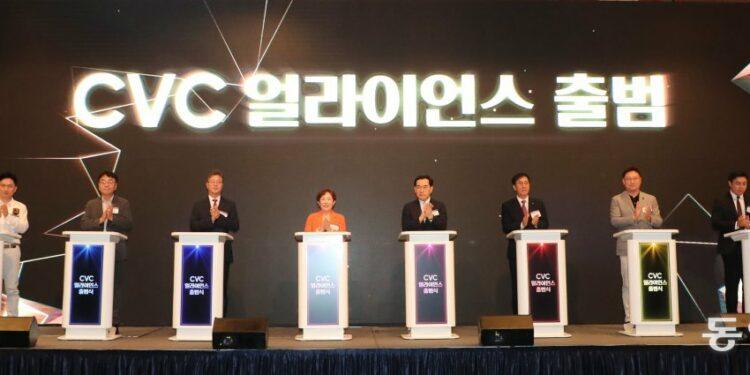The Korean Ministry of Trade, Industry, and Energy (Ministry of Industry) joined hands with 42 domestic corporate-led venture capital (CVC) companies to announce the CVC Alliance’s launch on July 24. The inauguration ceremony at the Lotte Hotel in Seoul marked a significant step towards fostering innovation in the domestic industry and strengthening collaboration between startups and established corporations.
The CVC Alliance aims to create a total of 8 trillion won (6.2 billion USD) in CVC funds by 2025, including a 1 trillion won (783 million USD) policy fund and a 7 trillion won (5.4 billion USD) privately led fund.
CVC is a type of venture capital fund wherein corporate entities, including large and medium-sized companies and small and medium-sized enterprises, are the majority shareholders. It serves as a crucial bridge between established corporations and startups, allowing the latter to benefit from the resources and expertise of the former. Similar to Google Ventures in the United States, the CVC Alliance in South Korea is set to play a vital role in verifying technology, facilitating market development, and suggesting policies to the government to promote CVC.
Ambitious Goals of the CVC Alliance
42 out of 74 CVC companies participated in the CVC Alliance, including GS Ventures, Lotte Ventures, Hyosung Ventures, Kolon Investment, and Dongwon Technology Investment. POSCO Technology Investment served as the chairman of the alliance. The first step in creating the CVC fund was held with 121 billion won (94 million USD), including 51 billion won (39 million USD) for Hyosung Ventures, and 70 billion won (54 million USD) for Lighthouse Combine Invest.
Minister of Industry Lee Chang-yang said in his congratulatory speech, “The importance of CVC as a key player in promoting open innovation between key industries and new industries is growing in the global market.” The Ministry of Trade, Industry and Energy announced that it would also improve the issue of limiting the ratio of external financing when creating CVC’s funds and limiting the ratio of overseas investment in funds in consultation with related ministries.
The formation of the CVC Alliance signifies a significant step in South Korea’s quest to catch up with the CVC investment activity of countries like the United States. As of 2020, the share of CVC in the total venture capital (VC) investment in South Korea was only 23%, compared to 47% in the United States. With the establishment of the CVC Alliance and the planned funds, South Korea hopes to bridge this gap and boost its startup ecosystem.
Success Stories: CVC Investments and Startup Collaboration
Several success stories already demonstrate the potential benefits of CVC investments in South Korea. One such example involves Sunglim Advanced Industries, a company that manufactures permanent magnets for electric vehicle drive motors. Thanks to an investment from POSCO Technology Investment, a member of the CVC Alliance, Sunglim Advanced Industries utilized the global sales network of the POSCO Group to export 100 billion won (78 million USD) worth of permanent magnets to Vietnam. This collaboration showcases the instrumental role CVC funds can play in expanding startups’ market reach and accelerating their growth.
Another noteworthy instance involves Hyosung Ventures, a participant in the CVC Alliance. The venture successfully developed a bulletproof panel with enhanced performance by combining the carbon fiber composite material developed by Exia Materials with Hyosung’s aramid fiber technology. This highlights how CVC investments can facilitate synergies between startups and their parent companies, fostering technological advancements and innovative solutions.
Addressing Challenges and Future Prospects
At the inauguration ceremony, a discussion for vitalizing the CVC was held with Ewha Womans University professor Kim Jang-hoon as moderator. There was an opinion that the government needed to revise laws created for industrial promotion and regulation of large companies or that still needed to be revised in the early days of the VC industry.
Lim Tae-hee, head of the investment division at Lotte Ventures, said, “CVC, VC, and asset management companies have similar investment activities and targets, but the laws that are violated are different, such as the Venture Investment Act, the Specialized Credit Financial Business Act, and the Capital Markets Act.” Professor Kim said, “CVC-related laws span several ministries, including the Fair Trade Commission, the Ministry of Industry, the Ministry of SMEs and Startups, the Ministry of Strategy and Finance, and the Financial Services Commission, and it seems that the government needs to establish a control tower.”
Also Read,
- Yonsei University Global Program Explores Japanese Startup Ecosystem and Investment Landscape with Masaru Ikeda
- InHandPlus Secures USD 2.3 million Series A Investment to Expand AI-Powered Medication Management System
- South Korea Launches ‘Regional Angel Investment Fund’ to Boost Non-Metropolitan Startups
- South Korea & Saudi Arabia Create $160 Million Joint Fund to Foster Startups & Investment Cooperation
Keep tab on latest news in the Korean startup ecosystem & follow us on LinkedIN, Facebook, and Twitter for more exciting updates and insights.






